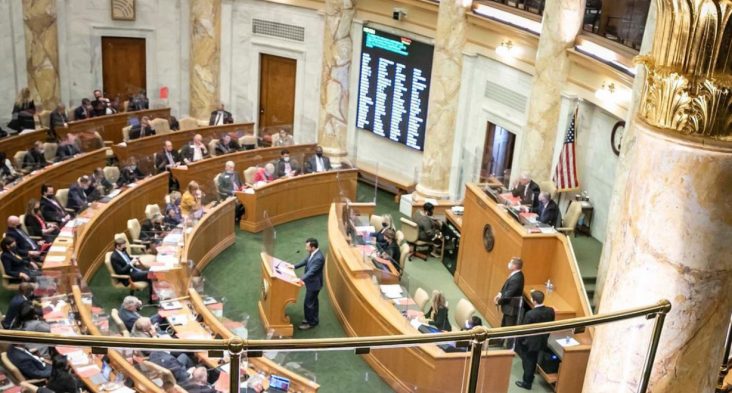Bill to limit governor’s emergency declarations heads to Hutchinson’s desk
by March 15, 2021 5:26 pm 1,128 views

The Arkansas House of Representatives passed a bill Monday (March 15) that would give the Legislature the power to end a governor’s declared disaster emergency. Another bill, opposed by the governor, would require state agencies to refund COVID-19-related fines levied on businesses.
The House also passed a bill allowing medical professionals to opt out of certain procedures, and it advanced a bill codifying COVID-19-related civil immunity.
Senate Bill 379, which would create processes for the Legislature to end a governor’s declared state of emergency, passed 78-16, with 1 voting present. The bill by Sen. Kim Hammer, R-Benton, and Rep. Jimmy Gazaway, R-Paragould, has already passed the Senate.
The bill would limit statewide states of emergency to 60 days unless renewed by the governor, but the Legislative Council could vote to deny the request for renewal. The Legislative Council is a group of lawmakers that meets when the Legislature is not in session.
In a statement released by his office, Gov. Asa Hutchinson said, “I support Sen. Hammer’s bill as drafted because it gives the governor the flexibility needed to manage during a crisis. It also provides an appropriate check by the Legislature. In its current form, I will sign the bill when it reaches my desk.”
The Legislature would be able to terminate the emergency by passing a concurrent resolution in a committee of the whole in both the House and Senate. The chambers could vote to override a governor’s veto of the denial in another committee of the whole.
Gazaway told House members that earlier in the pandemic, constituents were calling legislators to complain about directives, but all they could tell them was that they were issued by the governor and give them his office’s phone number. He said the bill was not meant as a criticism of Hutchinson, who had made difficult decisions during an unprecedented time. Instead, the bill’s purpose was to restore the balance of power so legislators would have a say.
The bill says the governor would declare a statewide public health-related state of disaster emergency if a communicable disease affects at least 19 counties or the total number of persons in at least 25% of the state’s population.The House and Senate would convene as a committee of the whole within eight business days of the governor’s declaration if it’s related to public health.
Governors who want to renew a state of emergency related to public health would have to submit a written statement to the Legislative Council at least 10 days prior to the date when the declaration would expire. Each renewal of a public health-related state of emergency could not exceed 60 days, and the governor would have to submit a statement to the Legislative Council with the rationale for the extension. The Legislative Council could end the state of emergency with a majority vote of a quorum present.
Governors’ extensions of executive orders and proclamations also would be subject to termination by the Legislative Council, which could meet at any time.
The bill states the State Board of Health or a designee could adopt directives imposing restrictions in response to a communicable disease. Those directives would be subject to termination by the Executive Subcommittee of the Legislative Council.
Gazaway said that under existing law, the Board of Health and secretary of health can quarantine everyone. Under the legislation, those directives would have to be made separately rather than as a group, and must be submitted to the Legislative Council individually rather than as part of a group of directives.
The House also passed a bill that would require state agencies to return COVID-19 fines levied on businesses from March 11, 2020, to Feb. 28, 2021. Senate Bill 301 by Sen. Dan Sullivan, R-Jonesboro, passed 67-20, with 6 voting present. The fines would have to be returned by June 30.
The bill would not apply to long-term care facilities, residential care facilities, assisted living facilities, hospitals, hospice facilities, human development centers, and any other residential facility housing 25 or more people. The bill would not apply to fines related to violations not related to the state of emergency.
Rep. Brandt Smith, R-Jonesboro, the primary House sponsor, said more than $60,000 in fines had been levied, with small businesses targeted by “overzealous inspectors” while big box retailers were left alone. Rep. Justin Gonzales, R-Oklolona, said the fines weren’t created by a state law, and businesses were fined for their customers’ violations. The bill would take effect upon approval by the governor or an overriding of the governor’s veto. The governor’s office said he opposes the bill.
In other COVID-related business, the House voted 79-11 with four present to codify a governor’s executive order issued last year that business owners and their employees would be immune from civil liability resulting from exposure to COVID-19 on the business’s premises.
House Bill 1487 by Gonzales would not provide immunity for willful, reckless, or intentional misconduct, and it would not prevent employees from receiving workers’ compensation benefits. Employers and employees would be presumed innocent if they are complying with health and safety directives from the governor, the Arkansas secretary of health, the Centers for Disease Control and Prevention, and the Centers for Medicare & Medicaid Services.
This act would take effect upon approval by the governor and would expire on May 1, 2023. It now goes to the Senate.
Finally, the House sent back to the Senate an amended bill allowing medical providers to refrain from providing procedures that violate their conscience. Senate Bill 289 by Sen. Kim Hammer, R-Benton, passed, 72-20.
Smith, the primary House sponsor, said the bill does not allow for discrimination and said similar laws in Illinois and Mississippi have not resulted in any legal challenges. Rep. Tippi McCullough, D-Little Rock, said the bill isn’t necessary and could lead to discrimination.
